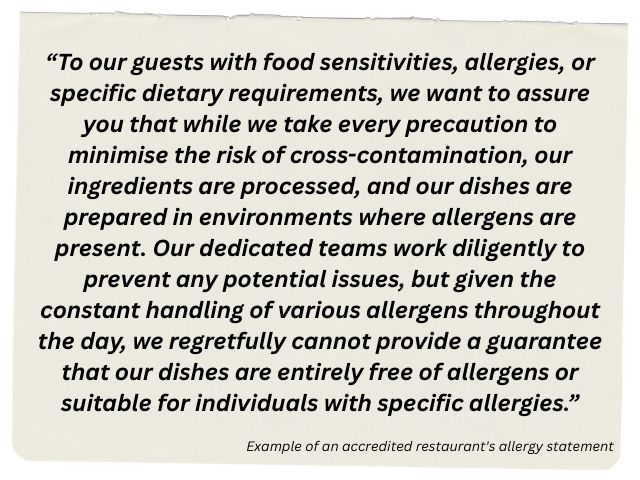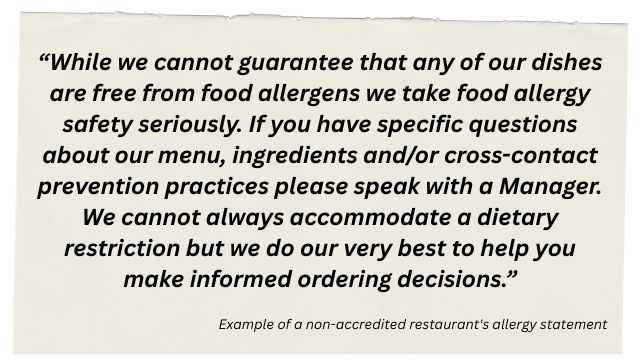Accreditation Schemes
Why accredited restaurants shouldn't be the only places you eat at


Fast Facts:
⚡ Costs vary by number of locations, starting at hundreds of pounds annually
⚡ The costly expense can prevent businesses from applying for accreditation
⚡ Many non-accredited restaurants follow strict gluten free protocols without formal verification
⚡ Accreditation doesn’t guarantee a risk-free environment - diligence from both diners and staff is still necessary
⚡ UK food safety laws require all restaurants to follow allergen safety regulations, including clear labelling, staff training, and proper food handling
⚡ Accreditation is helpful but not the only indicator of a safe dining experience for coeliacs
❓ What is a Gluten Free Accredited Restaurant?
An accredited restaurant is a paid scheme, where restaurants can apply for the gluten free accreditation and are evaluated based on their food preparation processes, staff training, and measures to prevent cross-contamination
The fee for the accreditation is annual and is calculated based on the number of locations a business has - it’s worth noting that not all restaurants within an accreditation are audited. At a minimum, the accreditation costs hundreds of pounds and increases depending on the number of venues.
Whilst accreditation provides reassurance, it does not guarantee a completely risk-free environment - diligence from both the restaurant and the diner is still necessary. There have been many instances where those gluten free have experienced incidents and unexpected glutenings from accredited venues.
It’s also important to note that the experience at accredited venues can vary based on factors such as staff knowledge, restaurant attitude towards allergen safety, and overall business operations. Even an accredited venue must ensure consistent training and staff awareness to maintain the high standards set by the accreditation.
Additionally, some restaurants might pursue gluten free accreditation as a marketing tool, leveraging the recognition to attract gluten sensitive diners, rather than doing so purely for inclusivity.
❔ Are Non-Accredited Restaurants Safe?
Absolutely - there are thousands of non-accredited restaurants that can be just as safe. A gluten free accreditation might provide extra recognition, but it is not the only indicator of a restaurant’s ability to cater safely for coeliacs, and in some ways can confuse coeliacs into thinking that non-accredited restaurants are off the cards when researching places to eat out. Many independent restaurants, cafes, and chains implement just as strict protocols to prevent cross-contamination, even without formal accreditation.
Both accredited and non-accredited places must adhere to the UK’s food safety laws, particularly those surrounding allergen compliance. These include:
- Clear allergen labelling and communication with customers
- Staff training on food allergens and cross-contamination risks
- Safe storage, handling, and preparation of gluten free ingredients
- Use of separate utensils and cooking areas where possible
👉🏼 Read more on Understanding UK Food Safety Laws
Key Differences Between Accredited and Non-Accredited Venues
- Accredited restaurants have undergone specific training and auditing by the relevant coeliac society, ensuring compliance with their standards
- Non-accredited restaurants may still follow strict procedures, but they have not gone through formal verification by an external body
- Both must comply with UK food safety regulations
Allergen Declarations: Accredited vs. Non-Accredited
Both accredited and non-accredited venues are legally required to provide allergen declarations for the safety of their customers. These declarations inform diners about the presence of allergens and potential risks, helping them make informed choices.
Example A

Example B

Although these statements differ in wording, they convey the same essential message: the restaurants make efforts to minimise the risk of cross-contamination, but they cannot guarantee the complete absence of allergens. Both accredited and non-accredited restaurants must communicate their allergen protocols clearly to customers. This transparency allows individuals with allergies or sensitivities to make informed decisions about whether to dine at these venues.
🫷🏽 Why Places Opt Out of Getting Accredited
Not every venue pursues a gluten free accreditation for a few main reasons:
1️⃣ Cost
The primary reason is cost. Accreditation requires a financial investment that some businesses, especially small independent ones, may not be able to justify. Businesses already have to pay for food safety audits and training so this additional costly accreditation may not seem justifiable when they already implement strong allergen safety practices regardless.
2️⃣ Requirements
Some venues may lack the necessary space for preparation areas or equipment so their application may be rejected
3️⃣ No Value
It’s entirely possible that some restaurants/other food places might not agree that it’s important to have an accreditation, rather than a lack of willingness to cater safely to coeliac customers
🎯 Quick Recap
While accreditation provides an extra layer, it’s important for coeliac diners to research and communicate with restaurants about their gluten free practices. Many non-accredited venues are just as committed to safety and offer excellent gluten free options but simply cannot afford or justify the costly accreditation.
The most important takeaway is that coeliac-friendly dining is expanding, and both accredited and non-accredited restaurants have a role to play in ensuring safe, enjoyable meals for all. By continuing to educate both businesses and consumers, we can create a more inclusive and accessible dining experience for those with coeliac disease.
Check out our Gluten Free Map for gluten free spots near you!